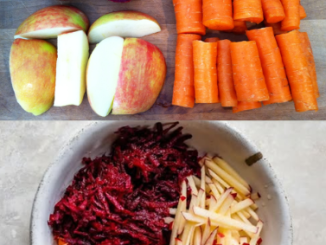
Why Gut Health Should Be a Top Priority
If you’ve ever felt off for no clear reason—think brain fog, low energy, or just that “blah” feeling—it might be time to look inward… literally. Your gut does way more than just digest food. It’s your body’s control center for immunity, mood, and overall wellness. And when things go out of balance down there, your whole system feels it.
The best part? You don’t need expensive pills or extreme diets to fix it. With a few simple changes, you can naturally support your gut and feel better from the inside out. Let’s dive into five easy, science-backed strategies to bring your belly—and your life—back into harmony.
Fiber: The Gut’s Favorite Fuel
You’ve probably heard this a hundred times, but let’s make it crystal clear: fiber is your gut’s best friend.
It feeds the “good” bacteria in your digestive system, helps keep things moving (you know what we mean), and can reduce bloating over time. When your gut flora is happy, everything else—from immunity to mood—improves.
Want to sneak more fiber into your meals?
- Trade white bread for quinoa, oats, or brown rice.
- Load your plate with veggies like carrots, Brussels sprouts, and broccoli.
- Snack on fruits like apples, pears, and raspberries (skin on, please).
- Toss chickpeas or lentils into your salad or soup.
Pro tip: Don’t ramp up too fast. Add fiber gradually and drink lots of water to keep digestion smooth and easy.
Probiotics: Bring in the Good Guys
Your gut is like a garden. And probiotics? They’re the beneficial bugs that help everything bloom.
Whether you’ve just finished a round of antibiotics or feel like your digestion’s a little off, probiotics can help rebuild and rebalance your gut microbiome.
Some superstar probiotic foods you can add to your day:
- Plain Greek yogurt or kefir with live cultures.
- Sauerkraut, kimchi, or other fermented veggies.
- Miso soup or miso-based dressings.
- Kombucha—just be mindful of added sugar.
Start small. Just a few spoonfuls of yogurt or a quarter-cup of kimchi is plenty to get things rolling.
Video : The 5 things you NEED to know for better GUT HEALTH with Professor Tim Spector
Hydration: The Unsung Hero of Digestive Health
Let’s talk water. It might not sound glamorous, but it’s a game-changer for gut health.
Your intestines need fluid to move waste through smoothly. Dehydration can lead to constipation, sluggish digestion, and that awful heavy feeling in your belly.
Here’s how to stay on top of your hydration game:
- Sip water regularly—don’t wait until you’re thirsty.
- Add lemon or cucumber slices for a little flavor.
- Snack on hydrating fruits like oranges or watermelon.
- Limit caffeine and sugary drinks—they can dehydrate you quickly.
Keep a water bottle handy, and refill it throughout the day. Your gut—and your skin—will thank you.
Manage Stress: Because Your Gut Feels Everything
Ever had butterflies in your stomach? Or felt sick when stressed? That’s your gut-brain connection in action.
Chronic stress doesn’t just affect your mood—it literally alters your gut bacteria. Too much stress can throw everything out of whack, causing bloating, gas, and even changes in appetite.
What can you do about it?
- Start with just 5–10 minutes of deep breathing or meditation a day.
- Take a walk outside—movement and sunlight work wonders.
- Prioritize sleep: 7–9 hours helps your gut heal and reset overnight.
- Laugh, talk, and connect. Social time lowers stress naturally.
Even a simple morning stretch can be enough to keep your stress levels—and your gut—in check.
Ditch Processed Foods and Sugar
Let’s be real: your gut wasn’t made to process neon-colored snacks and sugar-laden drinks.
Highly processed foods, artificial sweeteners, and excess sugar can feed harmful bacteria and throw your gut ecosystem off balance. You don’t have to eat perfectly—but making smarter swaps can go a long way.
Try this:
- Read ingredient labels. If you can’t pronounce it, reconsider.
- Cook at home when you can—simple meals with whole ingredients are best.
- Replace sugary treats with naturally sweet options like fruit and dark chocolate.
- Be cautious with “sugar-free” or “diet” items—they often contain gut-disrupting chemicals.
Once you start cutting back, your taste buds adjust, and you’ll crave junk food less. Promise.
Who Should Focus on Gut Health? (Spoiler: Everyone)
Whether you’re dealing with mild bloating, aiming to boost your immune system, or just want to feel your best, these tips are a safe starting point. But remember—if you have a chronic digestive issue like IBS or are on certain meds, always check with your doctor before diving into high-fiber or probiotic-heavy changes.
That said, most people benefit from a gradual, consistent approach. Introduce one habit at a time and notice how your body reacts. Your gut will let you know what’s working.
Smart Habits That Stick
Want to make these changes last? Try these easy tricks:
- Prep meals ahead with gut-friendly staples like oats, lentils, and leafy greens.
- Track how certain foods make you feel in a simple journal.
- Make grocery lists that focus on whole, unprocessed items.
- Pair habits—drink water while you check emails, stretch while your coffee brews.
It’s the little daily habits that build long-term gut resilience.
Video : 5 Superfoods for Healthy Gut| Boost Digestion, Immunity & Good Bacteria| Increase Calcium & Protein
Final Thoughts: Your Gut Deserves Some Love
Let’s stop treating gut health like an afterthought. This internal ecosystem plays a massive role in how we feel, think, and even age. The good news? You don’t need a 12-step detox plan or pricey supplements.
By simply eating more fiber, adding probiotics, drinking enough water, managing stress, and cutting back on processed junk, you’re giving your gut the love it needs to thrive.
So go ahead—take that first small step today. Your body will feel the difference, from the inside out.


